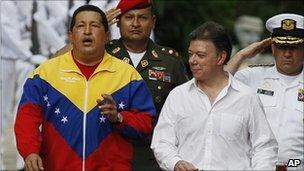Colombia and Venezuela restore diplomatic relations
- Published

Hugo Chavez, left, and Juan Manuel Santos in Santa Marta
Venezuelan President Hugo Chavez and his new Colombian counterpart, Juan Manuel Santos, have agreed to restore diplomatic relations.
Mr Chavez cut ties last month after Colombia accused Venezuela of harbouring left-wing rebels.
But at a meeting in the Colombian city of Santa Marta, the two leaders agreed to relaunch bilateral relations.
They admitted personal differences, but said they were putting them aside in the interest of both nations.
The two leaders met in the house where Simon Bolivar - a South American independence hero and Mr Chavez's idol - died in 1830.
New page
"We have had a frank, direct and sincere dialogue, and I think we have taken a big step in re-establishing confidence," Mr Santos said.
He said the two countries would exchange ambassadors as soon as possible.
For his part, Mr Chavez said he had come "to turn the page."
"We have to learn to live together," he said. "Our peaceful revolution in Venezuela does not represent any threat to Colombia."
The Venezuelan leader repeated his rejection of the allegations - by Mr Santos's predecessor, Alvaro Uribe - that 1,500 Colombian Farc and ELN rebels were sheltering on Venezuelan territory.
"The Venezuelan government does not support, or permit, nor will it ever permit, the presence of guerrillas or terrorists in Venezuela," he said.
The two leaders agreed to set up five commissions to address joint issues such as social investment, infrastructure, commerce free trade and security.
War fears
The agreement to restore ties follows two years of deteriorating relations between the two Andean neighbours.
The left-wing Mr Chavez froze relations last year after Colombia agreed to let US forces use military bases in its territory.
And when Mr Uribe presented evidence that Venezuela was harbouring rebels, Mr Chavez broke ties completely and sent troops to the border, saying he feared war.
Before Mr Santos was elected, Mr Chavez described him as a "threat to the entire region" whose election might lead to war.
But although he served as defence minister under President Uribe and shares many of his conservative political views, Mr Santos stressed he wanted compromise, not confrontation, with Venezuela.
The strained relations have cut bilateral trade by around 70%, with grave effects on border cities.
- Published11 August 2010
- Published21 June 2010
- Published6 August 2010
- Published4 August 2010